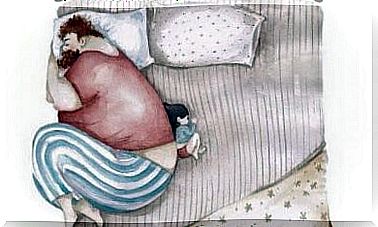The Five Types Of Mothers And Their Emotional Influence

Do you ever make small mistakes but feel like an absolute failure? Do you have a strong emotional dependence on your partner? Or do you avoid commitment at all costs? Maybe you have a hard time making decisions? All such situations happen every day in the lives of many people. Furthermore, although it may seem surprising, they are a result of childhood experiences and the different types of mothers they may have experienced.
In his book, The Mother Factor: How Your Mother’s Emotional Legacy Impacts Your Life , Dr. Stephan Poulter, an American psychologist, concluded that the influence of the bond you establish with your mother is evident even in your adult life. It reflects strengths, weaknesses, self-esteem and the way you relate to others.
He described five types of mothers in his book. They all have their own characteristics and pass on different inheritances to their descendants. Keep reading to find out more about them.
The five types of mothers
According to the author, there are five categories of mothers. The vast majority fall into one of them. However, a mother may have the characteristics of several types. Nevertheless, one characteristic usually dominates.

The perfectionist mother
These mothers are controlling, anxious and care deeply about their appearance. Their goal is to make the children and family look perfect in the eyes of the world.
These attitudes teach children to be hypercritical of themselves and constantly feel inadequate and inappropriate. They often have a great fear of criticism and rejection from other people, but they tend to judge others at the same time. For this reason, they end up being very demanding people. Furthermore, they have no patience for mistakes and do not tolerate frustration.
The unpredictable mother
These women use a chaotic parenting style, based on their emotional state that day. In fact, they do not know how to deal with their emotions and allow them to influence the way they interact with their children.
Children of these mothers tend to develop an ambivalent attachment and grow up in a constant alertness. In fact, they are forced to learn to read their mother’s emotional state in order to know what to expect from her.
These children also show their anxiety in their other relationships. In addition, they are afraid and unable to trust the stability of the love of others. They also tend to overreact to seemingly trivial matters.
Best friend mom
These mothers rarely set boundaries. They share secrets and even clothes with their children and behave like their peers. Furthermore, they do not take on the role of a responsible adult and may even burden children with the responsibility of being adults and caregivers.
Their children may grow up feeling abandoned or neglected. They will also experience great fear of rejection and a tendency to feel unloved in their adult relationships. In addition, they are likely to be involved in unbalanced relationships where they take on the caring role.
Me first-mom
This type of mother is self-centered, selfish and their children are not their priority. Thus, they grow up and feel that their role is to fulfill the mother’s wishes and needs, and that she is always right. In fact, their opinions become invalid and do not matter. The lack of emotional support they receive causes them to doubt themselves and their own abilities.
The complete mother
This is the ideal maternity style. However, only about 10% of children are lucky enough to have one. They are balanced, loving women who are able to guide and set boundaries.
These mothers encourage the development of autonomy and individuality. In this way, children grow up with healthy self-esteem. They feel loved and confident. As a result, they can take risks, adapt to change and establish healthy relationships.

All types of mothers promote the development of strengths
The above view may seem somewhat pessimistic. In fact, it seems that only a small percentage of people enjoy the benefits of proper parenting and secure attachment. Nevertheless, all types of mothers and the different parenting contexts they create contribute to building certain strengths in their children.
For example, the children of perfectionist mothers are responsible and persevering at work. On the other hand, unpredictable mothers lead a child to develop great empathic capacity. In the end, those raised with best friend mothers become determined adults who are able to take the initiative.
In short, no one can change their childhood relationships. However, they have the opportunity to extract valuable tools and learn from these circumstances. In fact, everyone has strengths. Whether they choose to take advantage of them or remain rooted in the thought of what could have been is up to them.









